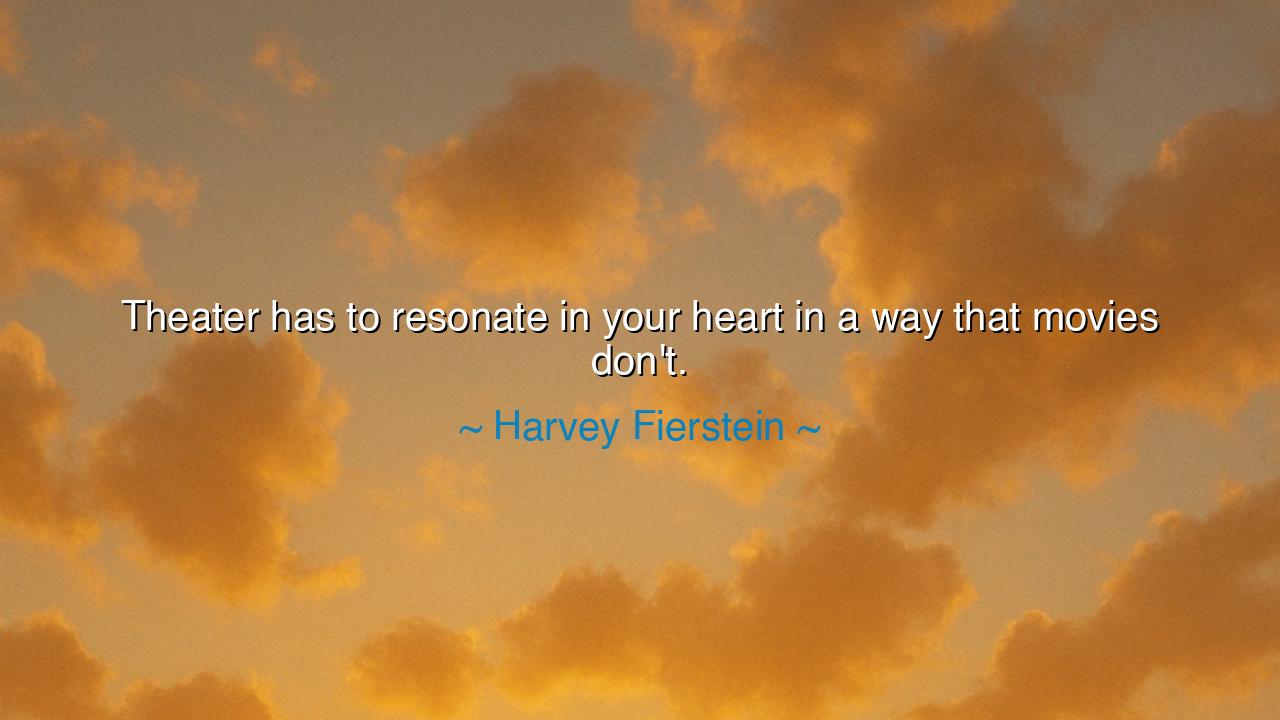
Theater has to resonate in your heart in a way that movies






Harvey Fierstein’s words, "Theater has to resonate in your heart in a way that movies don't," offer us a profound insight into the difference between two of the most powerful forms of storytelling—theater and film. Fierstein, known for his work in both realms, highlights the intimate, visceral connection that live theater fosters between the performer and the audience. Unlike film, where the audience is distanced from the action by a screen, theater requires an immediacy and raw emotion that strikes at the heart in a way that is both fleeting and eternal. Theater is a living, breathing art form, and as such, it has the power to touch our hearts in ways that film, for all its beauty, simply cannot replicate.
In the ancient world, theater was a cornerstone of cultural expression, deeply intertwined with the rituals and celebrations of society. Greek theater, particularly, was a space where human experience—in all its triumphs and tragedies—was explored in front of a live audience. Sophocles, Aeschylus, and Euripides wrote plays that did not just entertain, but challenged and transformed the audience. Theater was a communal experience, where the emotions of the performers and the audience were linked in a way that could not be replicated by other forms of storytelling. The audience felt the weight of the tragedy, the sacredness of the moment, as they watched actors in real-time embody the human condition.
Fierstein’s distinction between theater and movies evokes this ancient relationship between audience and performer. While movies certainly have their power to captivate and transport us, they exist in a more distant, mediated realm, where the connection between actor and viewer is indirect. Film can be carefully edited, manipulated, and framed to create an experience that can be profoundly moving, yet it is often the live performance of theater that creates the most immediate, raw emotional experience. Think of the ancient Greek amphitheaters, where the audience sat in a circle, their eyes fixed on the stage, feeling every gesture, every word, and every shift in the performance. The power of theater lies in its ephemeral nature—the fact that it exists only for a moment, never to be replicated again.
This ephemeral quality is what gives theater its magical power. In Shakespeare’s time, for instance, audiences flocked to the Globe Theatre, not to see a film or a recorded performance, but to experience the live embodiment of the world that Shakespeare had created. When Hamlet delivered his soliloquy, the audience felt every word, every pause, and every gesture in a way that was immediate and unrepeatable. In that fleeting moment, they shared in the character’s anguish and philosophical musings, an experience that is impossible to replicate on film. The immediacy of the actor’s presence, their energy, and the audience’s collective response created an atmosphere that made the experience alive—something that could not be captured by the stillness of a movie screen.
In the same way, Fierstein’s own work in theater—whether in "Torch Song Trilogy" or his other performances—demonstrates the unique resonance that live theater holds. His performances demand the kind of rawness and vulnerability that can only be achieved in a live environment, where the actor and audience share the space in a mutual exchange of energy. This dynamic is what makes theater not just a performance but a conversation—one that happens in real-time, where emotions are not only portrayed but felt deeply by both performer and audience. It is a shared experience of humanity—a sacred space where truth, in all its messiness, is allowed to breathe.
Let us turn to the story of the gladiators, who fought in the Colosseum in ancient Rome. While these battles were brutal and physical, they were also a form of theater—an arena where emotions ran high, where the audience was deeply involved in the drama unfolding before them. The crowd’s shouts, cheers, and jeers created an atmosphere of immense emotional exchange, even though the combatants were often fighting for their lives. Though the battles were physical, it was the shared emotional intensity of the crowd that turned these events into theatrical spectacles—a kind of live performance where the audience’s reactions shaped the energy of the experience. This direct connection between the performer and the audience is the same dynamic that Fierstein speaks of, where theater can penetrate the heart in a way film cannot.
The lesson here is profound: seek experiences that engage you at a deep emotional level, where you can be present in the moment and fully feel the intensity of the shared experience. In a world that increasingly moves toward virtual and mediated experiences, it is easy to forget the power of the live, the immediate, the real. Whether through theater, conversation, or even personal interactions, we must seek out the moments where we can truly connect with others, where the energy of the moment becomes a shared experience that shapes us all. Just as the ancient storytellers relied on their audience for feedback, so too must we remember that the richest experiences come when we are present, alive, and actively engaging with those around us.






AAdministratorAdministrator
Welcome, honored guests. Please leave a comment, we will respond soon